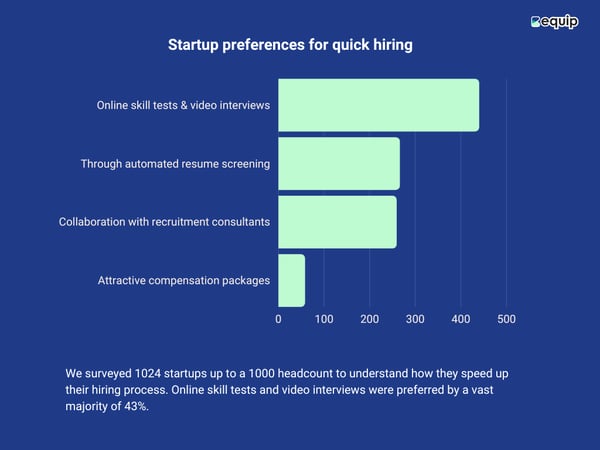August 30, 2023
 by Aishwarya Lohi / August 30, 2023
by Aishwarya Lohi / August 30, 2023

Hiring remains a critical decision for all startups at different stages - early, mature, and scaling.
Regardless of the scale and budget of the company for new hires, some fundamentals remain constant.
Companies always want to hire the right people with the right skills, who align with the cultural values and stick around for a significant time to make a sizable contribution during their tenure.
So, how should hiring strategies morph with time to meet these criteria? Any recruitment process should also account for hiring for different roles, such as technical and non-technical ones.
This article will guide you on the pros and cons of in-house vs. outsourcing hiring strategies for early-stage startups.
The first few employees in a startup can make or break its odds of success. The rapid pace of experiments and execution at startups makes hiring the right people at the right time crucial.
Lean startup teams cannot afford to spend much time or resources on recruiting.
In the initial stages, founders should be closely involved in hiring, whether they build their team in house or outsource it. Likewise, the subsequent handover to the talent acquisition team should still maintain the integrity of the process.
The importance of effective hiring for startups stands out when Patrick Collison, the CEO at Stripe, said,
“In hiring, maybe the reason the first ten people you hire, the decisions are so important that aren't just hiring those first ten people, you are actually hiring a hundred people because you think each one of those people are going to bring along another ten people with them.”
In-house recruitment teams work for the given employer full-time, so consequently, they hire talent to retain it long-term for the company and, in the process, also improve employer branding and set up processes to strengthen in-house recruitment for the future.
Simply put, in-house recruitment is a company employee managing the end-to-end process of sourcing, screening, assessing, interviewing, and providing the offer letter to candidates. In-house recruitment usually involves hiring full-time employees.
The first few employees in a startup require skills beyond their primary, domain-specific role.
They must adapt to the dynamic nature of the team’s changing needs with traits such as problem-solving skills, bias to action and execution, and more. The insight that a founding team brings to the table in terms of the vision of the company and its long-term impact proves invaluable in facilitating these conversations.
The founding team is the best to know the scope in which different team members can contribute to shared responsibilities and set the right expectations while hiring in-house.
For example, suppose a developer sourced from an agency at an early-stage startup builds features in isolation without talking to product users. In that case, it will cause downstream problems for the company.
In-house hiring gives flexibility to tweak the hiring process according to the role. For instance, the process for entry-level hiring will differ from lateral hiring. However, some parts of preliminary screening can work for both. In-house hiring allows you to decide this and make quick modifications when required.
When your team knows a candidate would be an excellent addition to your team, they can allay any fears of joining an early-stage company and share their experiences and specific perks that have benefited them as individuals, professionally and personally. An agency would lack an insider’s perspective on this.
Setting up in-house processes needs the right tools and dedicated individuals to manage them. This incurs a significant time and cost of the company’s resources. While setting up these tools, ensure they accommodate the pace and frequency of your hiring.
Ideally, avoid tools that charge monthly subscription fees even when you pause hiring and prohibitively increase your expenses when you ramp up hiring.
Every role you hire for may present a unique set of challenges. Popular and in-demand roles in sales, marketing, and software development are likely to receive many applications, and the challenge would lie in shortlisting the most eligible prospective employees.
A team hires a new employee for two main reasons: to expand the competency of the existing team or to expedite the delivery of projects. The former is a catch-22 situation wherein outsourcing might be considered an alternative.
If you face this challenge for hiring freshers, skill assessments for entry-level hiring can help you mitigate it. Young talent eager to join a new workplace is more receptive to proving their competency on the skill tests to land a job.
Also, skill tests are an objective measure of the candidates’ skill levels which corroborate the skill proficiencies outlined in CVs, thus reducing the chances of mis-hires.
Recruiters from outsourcing agencies are familiar with hiring across industries for various skill sets.
Outsourcing recruitment entails delegating a company's hiring procedure to an external service provider. The recruiters from these agencies will work for multiple clients at a time, and their performance will be primarily driven by the incentives they receive on successful hires for the position.
Some outsourcing companies also provide additional services such as legal compliance, onboarding new employees, and replacing talent during training.
Outsourcing hiring or the position itself makes sense when it’s a contractual agreement for a limited period or a fixed project. Recruitment agencies operate to hire at scale. So, your team does not worry about scaling recruitment when it is outsourced.
Outsourcing recruitment has gained popularity due to its cost-effectiveness and specialized expertise. However, this approach comes with its own set of limitations and potential challenges.
The most apparent concern is the reduced control over the recruitment process. Handing this critical task to an external agency can result in subpar hires misaligned with company values and objectives.
Additionally, there's a risk of overlooking cultural fit and alignment when relying on an outsourced team that might not fully understand the company's culture. This can lead to employee dissatisfaction and turnover in the long run.
Communication and coordination problems are common, as outsourcing may involve working with a remote team in a different time zone. This can hinder real-time interactions and lead to delays in decision-making.
To overcome these challenges, you must carefully select reputable outsourcing partners, establish clear communication channels, and provide comprehensive guidelines to ensure successful collaboration. Balancing the benefits and drawbacks of outsourcing recruitment is vital to achieving a well-rounded hiring strategy.
The choice between in-house hiring and outsourcing depends on the scalability of the hiring process, budget allocation, and optimizing the time to hire.
Research from SHRM suggests that while hiring in-house, requisition per recruiter can be a misleading indicator to base your decision on.
The nuances for hiring for every position in terms of the time to hire, the volume of candidates, and the rigor of screening and interviewing them can differ vastly, which is not a factor for requisition numbers.

Source: Equip
Balance the pros and cons of hiring in-house or outsourcing your hiring. The benefits of each option might outweigh the other.
However, adopting a hybrid approach is an intelligent bet.
Suppose your team’s expertise lies in hiring for niche roles, and they struggle with handling large volumes of applications for other common positions within the industry. In that case, the situation calls for a hybrid approach.
Whether you choose in-house hiring or outsource it for your startup, automating the screening and shortlisting of candidates is easily achievable through common HR tech platforms.
Opt for tools that seamlessly integrate with your current hiring for in-house recruitment and outsourcing partners that use them efficiently to help you hire faster.
Learn more about how G2's Global Hiring categories can help you source, filter, and hire employees internationally.
Aishwarya, a product marketer at Equip, drives growth and engagement. With a knack for experimentation, captivating content creation, and meeting customer needs, she has experience in analyzing competitors and delivering exceptional results. Beyond marketing, she has also worked in education.
But what exactly does it mean to have a great hiring process?
 by Rada Abdo
by Rada Abdo
Recruitment is integral to any organization’s success and growth.
 by Varshini Ravi
by Varshini Ravi
I’ve spent the past few months talking to recruiters, HR leaders, and staffing firm execs who...
 by Kelly Stone
by Kelly Stone
But what exactly does it mean to have a great hiring process?
 by Rada Abdo
by Rada Abdo
Recruitment is integral to any organization’s success and growth.
 by Varshini Ravi
by Varshini Ravi


